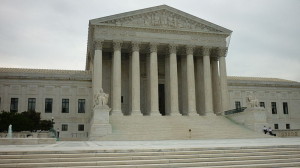
This week, the Supreme Court will be the focus of intense scrutiny as oral arguments about the constitutionality of the Affordable Care Act (or “Obamacare,” as even the Obama campaign now calls it) unfold. Americans lined up for hours, some camping overnight, for the opportunity to watch the arguments. A number of protesters milled around, some accompanied by a brass band. One thing is for sure: even if the Supreme Court determines that it cannot rule on Obamacare this year – as Suzy Khimm explains at the Washington Post, the Court will open oral arguments with a debate over whether it can rule in the case, given that penalties for not carrying insurance have not yet come into effect – there will be Americans on both sides of the issue with passionate, vehement opinions.
Religious Americans, for example, are deeply divided about what they think the law will do to the affordability of health insurance. When asked whether, in the long run, the health care reform law will make health care more affordable for Americans, less affordable for Americans, or make no difference, a slim majority of white evangelical Protestants (51%) and white mainline Protestants (52%) agree that the health care reform law will make health care less affordable.
Catholics are, meanwhile, more divided: nearly 3-in-10 (28%) say the health care law will make health care more affordable, just over one-third (37%) say it will make health care less affordable, and 3-in-10 say that it will make no difference. Fewer black Protestants believe that the health care reform law will make health care less affordable (17%), but more believe that it will make no difference (43%) than believe it will make health care more affordable.
On a separate but related issue, religious Americans are also divided on whether the health care reform law will lead to more people actually having health insurance. Black Protestants are the only religious group where a majority (65%) believe that the health care law will result in more Americans having health insurance. By contrast, only 1-in-5 white evangelical Protestants believe that health care law will result in more people having health insurance coverage. A slim plurality of Catholics say that the health care law will lead to more people with health insurance (36%), although one-quarter say that the law will lead to fewer people with health insurance, and fully one-third say it will make no difference.
But criticism about the legislation has not been limited to its efficacy in controlling costs or increasing coverage. Some critics of the health care law, which requires all employers (with the exception of explicitly religious organizations) to provide no-cost birth control as part of their health insurance plans, appear to see the contraceptive mandate as the opening salvo in a full-on war against religious liberty. But, as Dr. Robert P. Jones pointed out in a piece for NPR last week, “Most Americans — including most Catholics — do not believe that the right of religious liberty is being threatened in America today.” White evangelical Protestants remain the only religious group that are noticeably concerned about the health care reform law’s impact on affordability and accessibility, as well as the health care law’s potential infringements on religious liberty.




